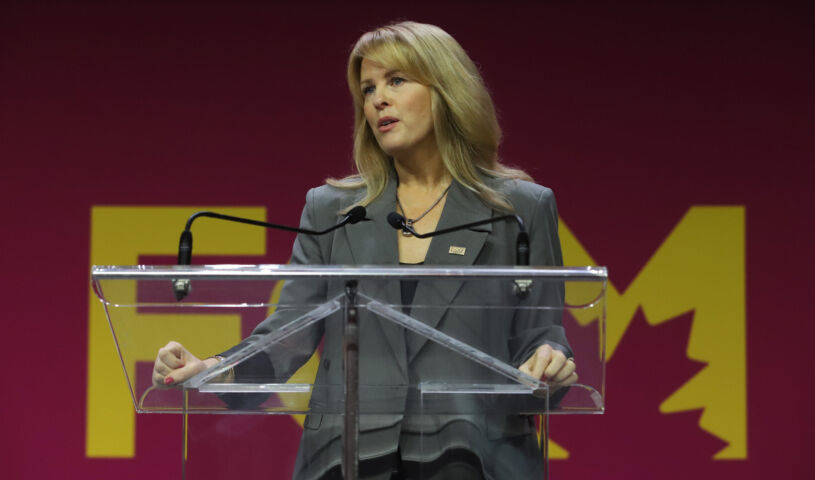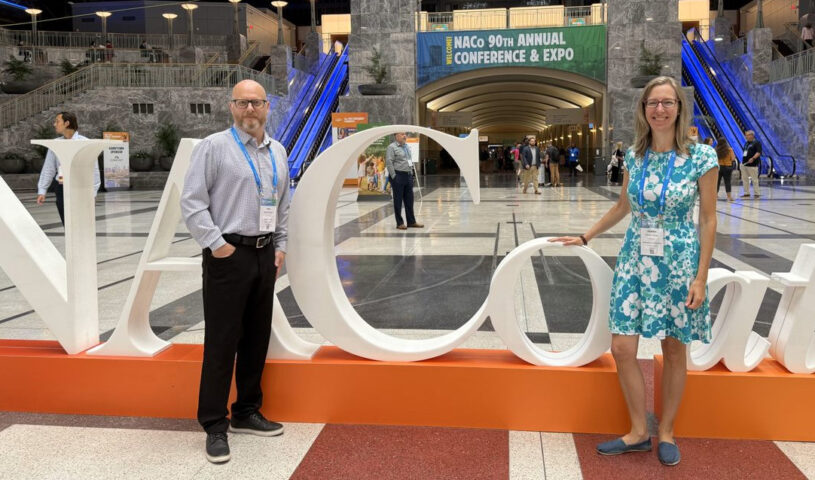FCM pleased with positive early efforts from Carney government
 Rebecca Bligh, president of the Federation of Canadian Municipalities, praised Prime Minister Mark Carey for his government’s early progress on the pledged, results-driven collaboration with municipalities. Photo: FCM Media Team
Rebecca Bligh, president of the Federation of Canadian Municipalities, praised Prime Minister Mark Carey for his government’s early progress on the pledged, results-driven collaboration with municipalities. Photo: FCM Media Team
At the 2025 Federation of Canadian Municipalities (FCM) conference, in Ottawa, Prime Minister Mark Carney emphasized the need for pragmatic, results-driven collaboration with local governments.
Carney spoke to some 2,000 FCM conference delegates on May 30, just weeks after unveiling his inaugural cabinet on May 13. Carney said collaboration between the federal government and municipalities is “more important than ever.”
Fireside with the Prime Minister
FCM President Rebecca Bligh, who is also a Vancouver city councillor, spoke on stage with Carney in a low-key, fireside chat. During the conversation, Carney echoed FCM’s call for a new era of coordination while aligning on shared priorities like housing, infrastructure, and economic resilience.
Bligh said she welcomed the prime minister’s participation in the conference, both through his brief keynote address, but also during the fireside chat. She welcomed his comments around the Housing Accelerator Fund and how he plans to engage municipalities in rolling out the commitment around housing.
Bligh said she was pleased that a seed had been planted for future, structured discussions around an intentional and structured conversation around municipal finance reform. She also noted Carney was “pretty straight” in his commitment to moving some pieces forward quickly in order to increase the country’s economic sovereignty.
“He understands the urgency in addressing the sort of projects that need to happen along with a budget this coming fall,” Bligh said. “He was honest and realistic about what he’s committed to delivering while keeping the door very much open in terms of understanding what FCM’s priorities are around a national prosperity partnership.”
Understanding Bill C-5
Since Bligh’s sit down with Carney, the Liberal government passed Bill C-5, the One Canadian Economy Act. The legislation essentially gives the federal cabinet the ability to pick certain projects to speed through the regulatory process. The prime minister has said streamlining approvals and reducing bureaucratic delays means municipalities will be able to more quickly access federal funding for major projects in areas such as housing, transit, and climate adaptation infrastructure.
From FCM’s perspective, Bligh said, municipalities are the engines of the country’s economic growth. They also sit at the front lines of that service delivery.
As such, she added, the best way for national prosperity to be achieved is through partnerships with every order of government and stakeholder group.
And that, Bligh said, is how FCM is looking at Bill C-5.
In order for the legislation to succeed, Bligh said, it needs to reflect a true national prosperity partnership that includes local governments as equal partners. “That’s really what is important to us at FCM. We’re not asking for more power; we’re just simply saying we want that seat at the table and meaningfully, including municipalities in the planning and implementation of Bill C-5.”
There have been numerous criticisms of Bill C-5, such as sidestepping environmental laws, the concentration of power in the hands of cabinet, and the speed in which the legislation was rushed through Parliament.
But one particularly concerning area for many people has been – especially from Indigenous leaders – is how the bill could be used to override treaty rights and weaken the federal duty to consult with First Nations, Inuit, and Métis communities on major projects.
To this point, Bligh said she is confident that Indigenous consultation won’t be ignored
“Each local government has their unique relationships and partnerships with First Nations,” Bligh said. “We are, in that vein, best positioned to leverage those existing relationships and to support the efforts of the federal government with C-5 to ensure that the nuances and priorities in a hyper-local context are reflected. That includes the work we do with Indigenous stakeholders every single day.”
Satisfying Early Results
When looking at the actions Carney has taken since he was sworn in as prime minister back in March, Bligh said she sees a “welcomed step forward.”
This is particularly true, she said, given FCM members have time and again spoken out around the need to prioritize the removal of inter provincial trade barriers. Doing so, she said, would help ease workforce shortages – particularly in construction, trades, and engineering – by making it easier for skilled workers to have their credentials recognized and move between provinces.
This would allow municipalities to access a more adaptable and diverse workforce to meet pressing infrastructure needs.
All that said, Bligh was quick to say FCM is going to continue to press for municipal priorities from coast to coast to coast.
“We plan to continue to focus on infrastructure and the types of infrastructure projects that are necessary to make interprovincial trade possible,” Bligh said. “We have a dynamic agenda ahead of us and we won’t be taking our foot off the gas anytime soon.”
Team Canada’s Ongoing Efforts
While FCM and the federal government have focused a lot on the Canadian side of the border with the United States, that doesn’t mean work hasn’t continued to address the tariff war instituted by President Donald Trump.
The latest effort on the tariff front saw Windsor Mayor Drew Dilkens and Saint John Mayor Donna Reardon representing FCM at the 93rd annual United States Conference of Mayors in Tampa, Fla.
The appearance in Tampa only happened recently, so Bligh hasn’t yet been briefed on the specifics of what those discussions delivered.
But at the same time, she said FCM is grateful to continue to be engaged in meaningful ways with their U.S. counterparts. This includes having Dilkens and Reardon in Tampa, but also the U.S. mayors that travelled north to take part in the FCM conference.
This shows, Bligh said, that there continues to be productive conversations happening between the mayors of the communities that are impacted by this “unjust and uncalled for trade war.”
Bligh said the prime minister’s office has made a productive, focused effort to resolve the trade war. She emphasized the importance of continuing those conversations in the weeks ahead.
“Our members are continuously ensuring that we’ve got the very latest of how these tariffs are impacting their local communities, economies, and small business,” Bligh said. “We continue to see a level of caution when it comes to investment in local businesses and local economies. We’re seeing businesses and industries holding off from that from any additional investment in an anticipation of what this could look like. And so this work will continue.” MW
✯ Municipal World Executive and Essentials Plus Members: You might also be interested in Kara Smith’s article: Even small municipalities can do big things.
Sean Meyer is digital content editor for Municipal World.
Related resource materials:



